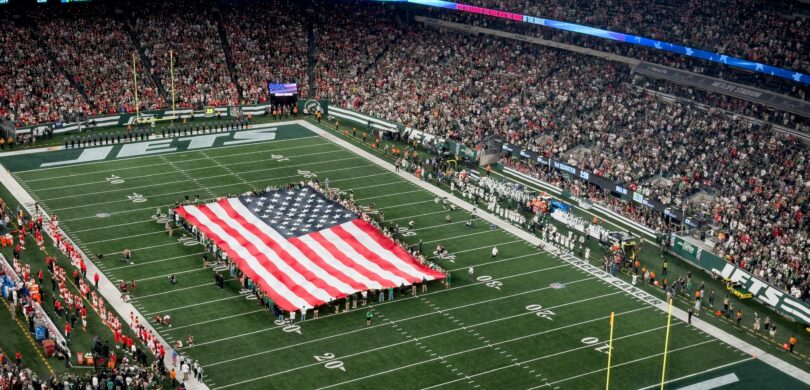Since 2018, sports betting laws have shifted quickly. How should we, and, more importantly, effectively regulate this massive industry? Learn more today.
For decades, sports betting was effectively banned in nearly every state. Sports fans who wanted to bet on March Madness or the Super Bowl, for example, found an illegal, black market “bookie” or flew to Las Vegas. Then, in 2018, the Supreme Court overturned the federal legislation prohibiting sports betting. From that point on, states governments were allowed to decide for themselves whether to permit sports betting.
A massive explosion in sports betting followed. Anyone online has seen the ads. FanDuel, Draftkings, and many more spend millions annually on marketing. They place sports betting advertisements on sports broadcasts, podcasts, Youtube videos, and more. These companies are working hard to attract users to their new industry, often offering generous promotions and free money. And the marketing seems to be working.
Sports betting is now a multibillion dollar industry with millions of customers nationwide. Proponents argue that legal sports betting is a matter of individual freedom. Plus, it has brought a significant new source of tax revenue. But, the industry also has its detractors. Critics warn that the ease and accessibility of sports betting, particularly online sports betting, could create a spike in problematic behavior and addiction.
Sports betting laws shifted quickly. It’s already been incredibly consequential, creating a massive new industry with millions of users. The long term impacts remain an open question.
What Is Sports Betting?
Sports betting is a form of gambling in which participants wager on the outcome of sporting events. Sports betting can take place in any sport, but basketball, baseball, and football see the most activity in the United States. Companies that offer sports betting, called sportsbooks, are regulated by state governments.
Often, sports betting is not as simple as betting on the final outcome of a single game, called a straight bet. Participants can also bet on the spread — or the expected margin of victory in a game. Prop bets, bets made on the performance or stats of a specific player, are also common.
Online sportsbooks have also popularized the parlay, or a bet that combines multiple straight wagers. For example, say someone bets that both the Dallas Cowboys and the New York Jets will win their games over the weekend. That is a multi-game parlay. If Dallas wins but New York loses, the gambler gets no payout, but if both win, they’ll get a bigger payout than if they had made two disconnected straight bets.
Sportsbooks facilitate these and many other kinds of wagers in a vast array of sports, from football to horse racing.
What Is the Sports Betting Industry?
Sportsbooks like Fanduel, Draftkings, and BetMGM are gambling companies with a focus on sports gambling. Some sportsbook companies only offer sports betting. Others, like BetMGM, are the instruments of legacy gambling companies that also operate traditional casinos.
Much of the sports betting industry takes place online as most states with legal sports betting also legalized online sports betting. Thus, most sportsbook companies allow users to place bets on games via an app on their smartphones or their websites. Sports gambling does still occur in-person, particularly in Las Vegas and other destinations. The industry calls in-person sports gambling retail sports betting.
The History of Sports Betting Laws
For most of the 20th and 21st centuries, sports betting was largely illegal outside of Nevada. Though not explicitly banned until 1992, laws were passed throughout the 20th century that functionally prohibited the industry. Sports betting was confined to the gray or black markets.
In 1992, Congress passed the Professional and Amateur Sports Protection Act. The Act formally banned sports betting outside of Nevada and tribal casinos, with few exceptions. Sports fans looking to bet on March Madness or the Super Bowl had to fly to Las Vegas or find an illegal, black market bookie. Proponents argued that the law would protect the integrity of sporting events. Sports leagues like the NBA and NFL supported the policy.
The Supreme Court & Sports Betting
Then, in 2018, the Supreme Court overturned the Professional and Amateur Sports Protection Act of 1992. The Court declared the policy an unconstitutional limit on state sovereignty. Suddenly, the question of whether to allow sports betting and how to regulate it was back in the hands of state legislators. States were free to create and tax their own sports betting industries.
The Court’s decision in Murphy v. National Collegiate Athletic Association was the result of a multi-year campaign by the State of New Jersey to legalize the industry. Legal experts and the gambling industry largely predicted the case’s outcome. Many states and companies were prepared to establish legal sports gaming industries once the ruling was official.
The Current Legal Landscape & Different Approaches to Sports Betting
Many states quickly moved to legalize sports betting after the Supreme Court’s decision in Murphy v. NCAA. It has been just six years since the decision. However, states have moved quickly on the path to legalization. Sports betting is now legal in thirty-eight states, twenty seven of which also allow online sports betting.
States have taken different policy approaches to legalizing sports betting. Some, such as Montana, South Dakota, and Nebraska, allow retail sports betting but do not permit any online betting. Another more conservative approach is to allow only recognized Native American tribes to offer sports betting. Washington, North Dakota, and New Mexico have taken this approach.
One common limitation on sports betting is a ban on college sports betting. Oregon and Tennessee have a blanket ban on all college sports betting. New York, New Jersey, Rhode Island, and a few others ban wagers on in-state college sports.
There are still a few holdout states that do not allow any sports betting. Alabama, Georgia, South Carolina, Texas, and others have refrained from legalizing sports betting. However, sports betting bills have been proposed in each state with varying success.
Despite these holdouts, most Americans now live in a state where both retail and online sports betting is fully legal.
The Future of Sports Betting Laws
Critics have serious concerns about the harmful effects of legalizing sports betting. This is particularly true of online betting. Thanks to online sports betting, gambling is now easier to access than ever before. Millions of Americans can now conveniently place bets from an app on their phone. That ease of access means more users and the possibility of more gambling problems.
America is only six years into its online sports betting experiment, so data on its impact is limited. Advocates on both sides of the issue instead look to the experience of other countries. The United Kingdom legalized online gambling more than fifteen years ago. Outcomes from across the Atlantic have been concerning. Sixty percent of online gambling industry profits come from just 5% of customers. As many as 138,000 people in England are classified by British regulators as problem gamblers. This includes 36,000 children aged 11-16. The UK government estimates that around 8% of suicides nationwide are linked to problem gambling and gambling addiction.
Regardless of the risks involved, it will be hard to put the sports betting genie back in the bottle. Sportsbooks have huge lobbying apparatuses, and there is little precedent for re-criminalizing industries in the United States. Even regulating gambling advertising will be difficult due to expansive First Amendment protections. America is likely stuck with sports betting for the foreseeable future, no matter the consequences.
Get Started with Plural for Monitoring Sports Betting Laws
- Sophie to write this copy


